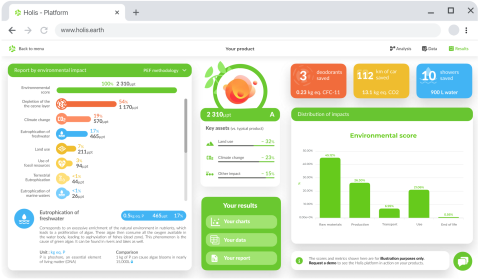
Holis: anticipating environmental impact from the design stage of products and services
By combining environmental science, user-friendly design and automation, the start-up Holis is developing a platform that facilitates life cycle assessment (LCA) for companies. Its solution makes it possible to anticipate a product's impact from the earliest design stages, with a level of detail that evolves alongside the development process to ensure the best possible representation based on available data.
It was a meeting between two alumni of the École normale supérieure (ENS) Paris-Saclay that led to the creation of the start-up Holis: Martin Besnier, from the department of teaching and research (DER) in biology and now CEO of Holis, and Paul Grédigui, from the DER in civil and environmental engineering, who is the start-up's CTO. After graduating from ENS Paris-Saclay, Martin Besnier continued his studies at École des Ponts, where he complemented his broad-based education with a year focused on design. Paul Grédigui, meanwhile, attended Imperial College London before also enrolling at École des Ponts, lending a more technological emphasis to his academic career. The two shared the same ambition: "To reduce a product's environmental impact, we have to start at the design stage, where choices around materials, processes, usage and end-of-life are made," explains Martin Besnier. From the outset of his studies, Martin Besnier has been passionate about life cycle assessment (LCA), a standardised method (ISO 14040) for evaluating the environmental impact of a product or service across its entire value chain.
Scientific and technological expertise to address system limitations
The start-up was founded in 2022 after being part of the Pépite (Pôle étudiant pour l'innovation, le transfert et l'entrepreneuriat - Student hub for innovation, transfer and entrepreneurship) programme. This is a national initiative created by the French Ministry of Higher Education and Research to support student entrepreneurship. The start-up also received backing from ENS Paris-Saclay's board of external relations, alumni and sponsors (DREAMS in French) scheme, which supports the creation of start-ups through mentoring, networking and financial assistance. Holis then joined Station F, Europe's largest start-up campus, where it continues to grow within an ecosystem designed to accelerate technology projects.
The start-up aims to make LCA truly scaleable and accessible, without compromising its precision. "The method is robust, but very demanding. It requires large volumes of data that are often unavailable upstream. As a result, companies tend to use it infrequently or too late in the process. We wanted to change that."
An automated LCA solution to support design
Holis is developing a digital platform designed to model the environmental twin of a product or service. The user inputs the data they have and Holis' technology completes the missing information using its proprietary algorithms, based on reliable public or industry-specific databases. When no exact data is available, the platform automatically selects an environmental proxy, i.e. a representative substitute based on similar materials or processes, in order to produce a reliable impact assessment. "We can generate up to 95% of the value chain in the upstream phases. Our models match appropriate environmental proxies, so the user doesn't need to search through obscure databases."
The solution covers the entire life cycle of a product or service: from raw material extraction, manufacturing and transport, to usage, energy and water consumption, right through to the end-of-life stages (recycling, incineration, landfill). Environmental impacts are assessed using around twenty recognised indicators, including CO₂ emissions, eutrophication - an imbalance in aquatic ecosystems often resulting from agricultural fertilisers or wastewater - ozone depletion and fine particle pollution.
Results can be presented in detail or aggregated in the form of a single environmental score, for ease of understanding. "It's a balance between scientific completeness and readability." This simplified score is especially useful for non-specialist decision-makers, allowing them to compare several design or material options without having to interpret dozens of technical values.
A cross-disciplinary solution designed for a wide range of uses
Holis doesn't just calculate environmental impacts. The platform also suggests eco-design strategies, identifies the most critical items and helps companies make the right choices. Compatible with a variety of business tools, it can be adapted to simple and complex products or services, whether in the R&D phase or already in use.
From the outset, the solution has been designed to be sector-agnostic. "That's essential, because value chains are always hybrid. For example, a garment involves petrochemicals, agriculture, chemistry, transport and user behaviour." This multi-sectoral approach is one of the differentiating factors that sets us apart from other LCA platforms, which are often restricted to a single industry.
A strong customer base and growing recognition
Holis already has several dozen customers across fifteen sectors, including household appliances, textiles, construction, aeronautics, mining, packaging and agri-food. These include PwC, Intersport and the French SME Daan Tech. "Our first customers enabled us to get started without raising funds, something we're particularly proud of, as it shows our ability to deliver immediate value."
The start-up has received several awards and accolades. These include the GreenTech Innovation label from the French Ministry of Ecological Transition, selection by Microsoft for its global environmental accelerator, a special mention from UNESCO as one of the 100 AI-driven solutions contributing to the Sustainable Development Goals (SDGs) and a place in Station F's Top 40 most promising start-ups.
Structured growth on the way to acceleration
Today, the company operates on a subscription model, based on the number of projects managed, in order to encourage cross-functional circulation of the tool within organisations. In addition, Holis offers consultation support, particularly on complex or underexplored technical subjects, such as the circular economy or modelling atypical value chains. In some cases, the team chooses to be directly involved: "We're keen to stay hands-on with certain projects to test our platform in real-world scenarios, refine its functionality and develop the interface."
The team has grown from two to eighteen people in under three years, and plans to raise funds in autumn 2025 to support its next growth phase. With this step, the start-up aims to strengthen its workforce - particularly in software development, R&D and administrative management - improve the platform's interface, expand its international presence, integrate the Corporate Sustainability Reporting Directive (CSRD) frameworks into its modules and enhance interoperability with the tools already used by its customers.
In a context of rapid regulatory change, where measuring environmental impact is becoming an essential requirement in many sectors, Holis aspires to establish itself as a key player in large-scale life cycle assessments.

